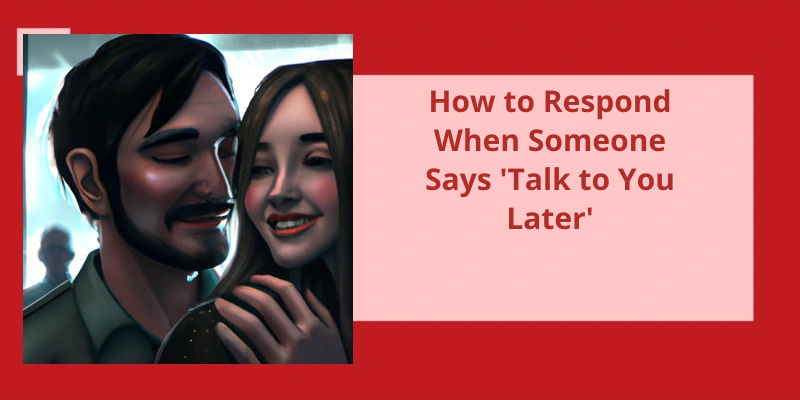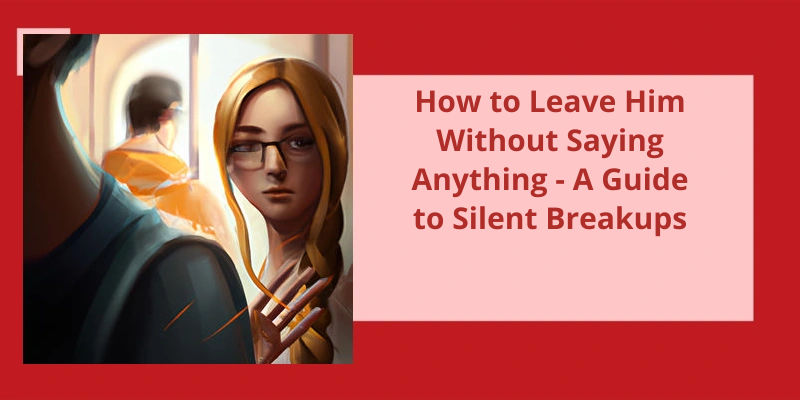In today's fast-paced world, communication has become an integral part of our daily lives. With so many ways to talk to each other, it's important to know how to reply when someone says, "talk to you later." This simple phrase could leave you wondering what exactly it means and how you should respond. Should you acknowledge it or continue the conversation? The answer to that question will depend on several factors, such as the context of the conversation, your relationship with the person, and your availability to talk at a later time.
How Do You Respond to I’ll Call You Later Professionally?
When someone tells you “Ill call you later”, the appropriate response may depend on the context of the situation. If the matter is urgent and you need the call to happen sooner rather than later, you might want to express that urgency in your reply. For example, you could say something like “If it’s possible, could you call me back within the next hour so we can discuss this further?”. This conveys a sense of urgency and also lets the other person know that you value their input.
On the other hand, if you don’t need the call to happen immediately, a more neutral response might be appropriate. “Okay” or “Thank-you” are both polite and professional ways to acknowledge the other persons message without adding any additional pressure. Similarly, “till then” or “talk to you later” are friendly ways to sign off, without implying that the conversation needs to happen right away.
It’s worth noting that the tone of the conversation can also influence your response. If the other person sounds rushed or stressed, a more urgent response may be appropriate. Conversely, if the conversation is casual or laid-back, you may want to respond in kind.
With a little thought and consideration, it’s possible to respond in a way that’s both polite and effective.
When it comes to conversations, it’s important to be open and available to others. But what do you do when someone says “we can talk later”? It can be a bit of a difficult moment, especially if you really wanted to talk and they seem to be brushing you off. However, the best way to respond is to simply agree to talk later and let them know that you’re available whenever they’re ready to open up.
How Do You Respond to We Can Talk Later?
However, it’s important to remember that “we can talk later” may also be a way of avoiding a difficult conversation or breaking bad news. In these cases, it may be important to gently encourage the other person to share their thoughts or feelings with you sooner rather than later. This can be done by expressing your concern and asking if there’s anything you can do to help or make the conversation easier. It’s also important to be respectful of the other persons boundaries and not push them to talk before theyre ready. At the same time, if youre the one who needs to talk and the other person consistently puts off the conversation with a “we can talk later” response, it’s okay to express your frustration or concern about the delay. Setting a specific time and date to have the conversation can also be helpful in ensuring that it actually takes place. Above all, clear and open communication is key to navigating any conversation, whether it happens now or later.
How to Communicate Effectively in Difficult Conversations
When having difficult conversations, it’s important to focus on active listening and clear communication. This includes using “I” statements to express your own feelings and avoiding accusing language. Being empathetic and trying to understand the other person’s point of view can also help to resolve conflicts and find common ground. Remember to stay calm and respectful, and if needed, take breaks to collect your thoughts.
Communication is a key aspect of our daily lives, and often, people use certain phrases and expressions to convey their message. One such phrase is “we’ll talk later,” which has gained a lot of popularity in recent times. Let’s explore what it means when someone says that and decipher it’s underlying message.
What Does It Mean When Someone Says We’ll Talk Later?
However, there are times when “well talk later” isn’t just a polite phrase. It could also signify that there’s an unresolved issue that requires further discussion. This could either be personal or professional; for instance, if youre trying to close a business deal, but some terms are still unclear, you may say “lets talk later” to provide yourself with more time to clarify the specifics. Similarly, if you and your partner have had an argument and one of you says, “well talk later,” it could mean that you both need some time and space to calm down and reflect upon the situation before you can discuss it in a more mature and constructive manner.
This is especially true for people who tend to be conflict-averse or conflict-sensitive. For instance, if someone makes an insensitive comment that offends you, you may choose to respond politely by saying, “Lets talk later,” instead of engaging in a heated argument. Although this approach may seem like a way to dodge the issue, it can also de-escalate tension and provide some breathing space for both parties to regroup and contemplate a way forward.
Another reason why someone may say, “lets talk later” is to signal that they’re busy or preoccupied. In todays fast-paced society, people are constantly inundated with work, commitments, and social obligations, which can make it difficult to find the time to have a meaningful conversation. By saying “lets talk later,” you acknowledge the importance of the discussion but at the same time, recognize that there are other pressing matters that demand your attention, which is entirely acceptable.
Tips for Initiating a Productive Conversation After Someone Says “We’ll Talk Later”
- Start by asking when would be a good time to talk.
- Summarize what was discussed in the previous conversation.
- Ask specific questions to clarify any points that might not be clear.
- Express your own perspective and ask for theirs as well.
- Listen carefully and show that you’re interested in what they’ve to say.
- Avoid making assumptions and stay open-minded.
- Keep the conversation focused on the topic at hand.
- End the conversation with a plan for follow-up and next steps.
Source: What does, “ I’ll speak with you later.”, mean? Does it … – Quora
The English language has various phrases that people use to end conversations, such as “talk to you later” or “speak to you later.” While seemingly interchangeable, there are different connotations associated with each phrase. This article will dive into the nuances between these two phrases and how to use them appropriately.
What Is the Difference Between Talk Later and Speak Later?
When it comes to language, even seemingly small differences in word choice can make a big impact on meaning. This is certainly the case with the phrases “talk later” and “speak later.”. While they may appear to be interchangeable at first glance, there are subtle distinctions that set them apart.
One key difference between the two phrases is their level of formality. This may not always be the case, but it’s worth considering the context and audience when deciding which phrase to use.
It’s also worth noting that these phrases can be used in different ways depending on the speakers intention. For example, “Ill speak to you later” might be a polite way to end a conversation that’s already run it’s course, while “lets talk later” could be an invitation to continue discussing a topic at a later time.
It’s important to consider the situation and the message you want to convey, and choose the phrase that best fits your needs.
Examples of Situations Where Using “Talk Later” or “Speak Later” Would Be More Appropriate
“Talk later” or “speak later” is more appropriate when you want to indicate that you don’t have time to discuss something right now, but you’re willing or able to do so in the future. Examples of situations include when you’re at work, in a meeting, or busy running errands.
It’s important to understand the ambiguity of phrases like “talk to you later,” as they may hold different meanings depending on the context and relationship between the speakers. Without further context or clarification, it can be difficult to discern the speaker’s intentions or the urgency of the conversation. Let’s explore this topic further to gain a better understanding of this commonly used phrase.
How Long Does Talk to You Later Mean?
The phrase “talk to you later” is commonly used as a casual way of communicating that the conversation will continue at a later time. It’s a way of indicating that the discussion isn’t concluded, and there’s more to be explored in the future. The phrase is often used when people are busy or need to attend to other obligations, both personal and professional. It’s commonly used in phone calls, text messages, and other digital communications.
In some cases, it may be a polite way of ending the conversation, with no intention of actually speaking again in the future. However, in most cases, it’s an indication that the conversation will continue at some point in the future. The phrase conveys a sense of openness and flexibility, giving the participants the freedom to continue the conversation when it’s convenient for both parties.
This means that it can be used as a general indication of future communication, without committing to a specific schedule. It’s an open-ended statement that allows for flexibility and spontaneity. This is especially useful in todays busy world when everyone is juggling multiple responsibilities and commitments.
This could refer to anything from a work-related discussion to a personal relationship issue. In these cases, the phrase is a way of acknowledging that there’s more to be discussed and that it can’t be resolved in the current moment. This can be a valuable tool for maintaining healthy relationships and resolving conflicts in a constructive way.
Whether it’s used in a personal or professional context, the phrase is a valuable tool for maintaining relationships and ensuring open lines of communication. As such, it’s an important part of our modern language and communication practices.
Etiquette and Proper Usage of the Phrase “Talk to You Later”
- Use “talk to you later” when you plan on speaking with the person again soon.
- Avoid using it if you don’t intend on talking to the person for a while.
- If you’re unsure when you’ll speak with the person again, opt for a different phrase such as “see you soon” or “take care.”
- Consider the context and relationship when deciding whether to use the phrase.
- Always end the conversation on a positive note, regardless of the phrase used.
Learning how to politely decline a conversation at the moment is an important aspect of effective communication. Many people struggle with finding the right words or phrases to use when they’re too busy to talk. In this article, we’ll explore some of the best ways to say “talk to you another time” without sounding dismissive or rude.
How Do You Say Talk to You Another Time?
When it comes to communicating with others, timing can be everything. Sometimes, you might find yourself in a situation where you’re too busy to speak at the moment. Perhaps you’re in the middle of an important task or meeting, or maybe you simply need a bit of time alone. In these instances, it’s important to let the other person know that you cant chat right now but that you’re still interested in continuing the conversation in the future.
One common way to convey this message is by saying, “Im busy now. Ill talk to you another time.”. This direct approach lets the other person know that you’re preoccupied at the moment and unable to engage in a conversation. However, it also implies that you’re interested in speaking with them again at some point in the future, which can help maintain a positive relationship.
Another option is to phrase your response in a more polite and considerate manner. For example, you might say something like, “Im a bit busy at the moment. Can we talk another time?”. This approach acknowledges that you value the other persons time and attention but that you’re simply unable to engage in a conversation right now. By asking if you can talk later, you also show that you’re committed to continuing the conversation when your schedule allows.
Of course, there are many other ways to communicate that you aren’t available to talk right now. Some people might say, “Im sorry, I cant chat at the moment” or “Im in the middle of something, can we talk later?”. It’s important to choose a response that feels authentic and comfortable to you, as this can help ensure that your interactions with others are genuine and meaningful.
Different Ways to Politely Decline a Conversation, Such as “I’m in a Hurry, but Let’s Catch Up Soon.”
- Sorry, I need to run now.
- I’d love to catch up soon, but now isn’t a good time for me.
- I appreciate the offer, but I’ve a lot on my plate right now.
- Thanks for thinking of me, but I don’t have the bandwidth for that right now.
- Let’s chat another time when I’ve more availability.
- Sorry to cut this short, but I’ve something I need to attend to.
- I’m sorry, but I’ve a deadline approaching that I need to focus on.
- I appreciate the conversation, but I’ve to be going now.
- Thanks for reaching out, but I need to decline for now.
- I’m interested in what you’ve to say, but unfortunately now isn’t a good time.
Conclusion
In conclusion, navigating social conventions and expectations around communicating with others can be a challenge, but there are some useful guidelines to keep in mind when it comes to saying goodbye and indicating a desire to continue the conversation later. It's important to be courteous and respectful in your approach, while also recognizing that people have different preferences and expectations around communication styles. Whether you choose to use the phrase "talk to you later" or come up with your own unique way of expressing a desire to continue the conversation, the most important thing is to be authentic, genuine, and thoughtful in your interactions with others. Ultimately, effective communication is about building trust, connection, and mutual understanding – and taking the time to show that you value someone's company and look forward to speaking with them again is an important element of that process.






